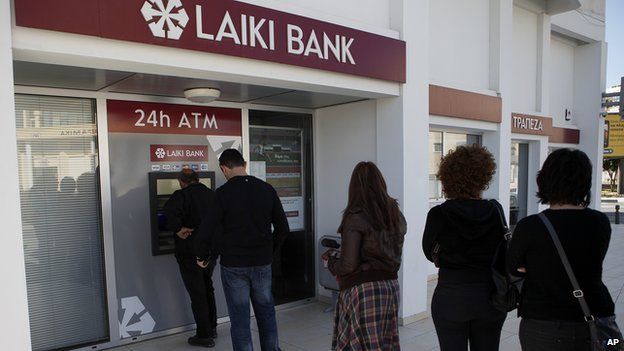Will the ECB play its trump card over Greece's future?
- 2 June 2015
- Business

The European Central Bank has the most powerful card, the ace of trumps if you like, when it comes to dealing with the Greek crisis.
If it chose, Mario Draghi, the president of the ECB, could put Greece in a position that would leave it little choice but to start printing its own currency, and in effect leave the eurozone.
But it's not a card that he wants to play.
The ECB's trump card
As the clouds have gathered again over Greece's economic future, customers have been pulling their money out of Greek commercial banks. Private sector bank deposits in Greece declined by €23bn (£16.3bn), or 18%, between November 2014 and March this year, according to figures from the Bank of Greece.
So far, what has happened in Greece is not a full-scale run on the banks. In a previous episode of instability three years ago it was called a "bank jog". But it's at a fast enough pace to be causing concern. Because if customers take enough of their money out, and if the bank can't raise enough new funds to allow them to pay out, then banks could fail.
For now, banks are able to rely on borrowing money from the Bank of Greece (the country's central bank) using an arrangement known as emergency liquidity assistance (ELA). That is currently reported to be €80bn and has been raised repeatedly in recent months.
And this is the trump card: it's the ECB's governing council that tells the Bank of Greece whether this should continue, whether it should limit the payments or whether it should stop funding the banks.
Could they play the card?
Is there a point beyond which the ECB would call a halt to the funds channelled through the ELA?
Certainly, though it's hard to put a specific figure on it.
The key point is that ELA is supposed to be available to European banks that are solvent, but facing temporary liquidity problems.
So if the ECB's governing council took the view that the Greek banks were not solvent it would have to tell the Bank of Greece to pull the plug.
Would they?
It's a principle behind ELA and behind central bank lending in general - you don't, or should not, lend to and prop up banks that are bust. Although admittedly it is not always straightforward in practice to identify whether a struggling bank is bust or just having temporary liquidity trouble.
We know enough about what happened in the case of Cyprus to be sure that it is something the ECB would consider.
The ECB did publicly threaten to put a stop to ELA for the Cypriot banks, unless there was an international bailout that would ensure they were solvent.There was a similar threat to Ireland in correspondence which has since been published.
As for the Greek banks today, the ECB's president Mario Draghi has said they will continue to receive funding as long they remain solvent and have adequate collateral.
The view at the ECB appears to be that the banks are in temporary difficulty.Executive board member Peter Praet said in April:
"The assessment that we get is that [Greek] banks are solvent, but it is true that it is a stressful situation".
The financial troubles of the Greek state are one of the sources of that stress. There's a kind of toxic embrace between the finances of the government and the banks. The banks own Greek government debt, and some of their capital is dependent on the Greek state.
So, if the interminable political negotiations between Greece and its eurozone partners conclude with the Greek state defaulting on its debts, the country's banks will also sustain financial damage. For its part the government is ticking over - just - partly due to short term borrowing from the banks.

Another factor with a bearing on the banks' solvency is the performance of the Greek economy. The worse it gets the more loans to business and households will not be repaid.
If at any point the ECB concludes the banks are bust it could yet decide to order the Bank of Greece to turn off the taps. Arguably, it should do so in those circumstances.
What would happen then?
If the ECB pulled the plug, then Greece's banks would collapse.
The government could try to impose financial controls (as Cyprus did for a time) but the banking expert Frances Coppola doesn't think that would work. Instead,she writes, if the ELA were turned off: "Greece would have no choice but to create a completely new currency and reflate its economy directly via the central bank. That means leaving the euro, at least temporarily."
So the ECB's trump card, if it were played, could have very dramatic consequences that would be profoundly political.
It is arguable that, legally, giving up the euro is incompatible with staying in the European Union. In those circumstances, perhaps Greece would make closer friends with other powers that the EU doesn't greatly care for, such as Russia and China.
There is also the idea built into EU treaties and ideology that the euro is supposed to be for ever. A departure from that principle would have serious political ramifications and as such would constitute intervention far beyond the remit of what was envisaged for a technocratic central bank.
The ECB's main job is supposed to be stabilising prices - not redrawing the European political map. It is far from relishing the powerful hand of cards it holds.
The bank probably wishes it wasn't at the table, or better still: that there was no game underway at all.

No comments:
Post a Comment